How to use onion peels for prostatitis: traditional medicine recipes for men
Prostatitis is a male disease characterized by inflammation of the prostate gland. It manifests itself as painful sensations in the scrotum, rectum, urinary retention, erectile dysfunction, and early ejaculation.
An advanced disease threatens infertility, impotence, cystitis, pyelonephritis, and chronicity of the pathological process. For a favorable outcome of prostatitis, it is important to provide adequate and complete treatment in a timely manner. Folk remedies are used as concomitant therapy. Has a beneficial effect on the condition of the male body and alleviates the severity of symptoms prostatitis onion peel.
Can onion peels help against prostatitis, prostate adenoma?
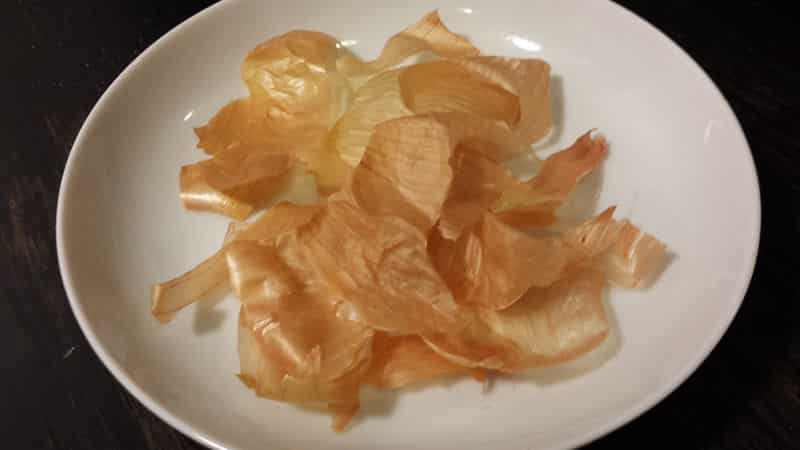
Among the generally accepted means of traditional medicine for the treatment of prostate diseases, the most powerful and radical is considered onion peel. It is used as an effective prophylactic against prostatitis and prostate adenoma.
To understand the mechanism of the effect of onion peels on the course of diseases associated with the male reproductive system, it is worth finding out what underlies the development of these urological diseases.
Prostatitis is an inflammation of the prostate gland, and prostate adenoma is the growth of the glandular tissue of the prostate. Most often, both diseases occur as a result of hormonal imbalance or infection and are accompanied by an inflammatory process.
For reference. It is widely believed that the formation of adenoma is associated with the presence of chronic prostatitis. In fact, scientists have refuted this hypothesis, and as statistics show, diseases can occur simultaneously or, conversely, independently of each other.
Long-term and systematic treatment of prostatitis with onion peels at home has a beneficial effect on the physiological capabilities of the male reproductive system, alleviates the severity of symptoms, prevents the development of complications and chronicity of the pathological process. The husk of the bulbs gives a powerful antibacterial, anti-inflammatory, antispasmodic effect, and enhances immune defense.
Despite all the beneficial properties of onions, apart from the main methods of treatment, this product is not able to radically affect the causes of urological diseases and associated pathologies. Onion peels are used exclusively in combination with conservative methods prescribed by a doctor.
Useful properties for prostatitis, effects on the body
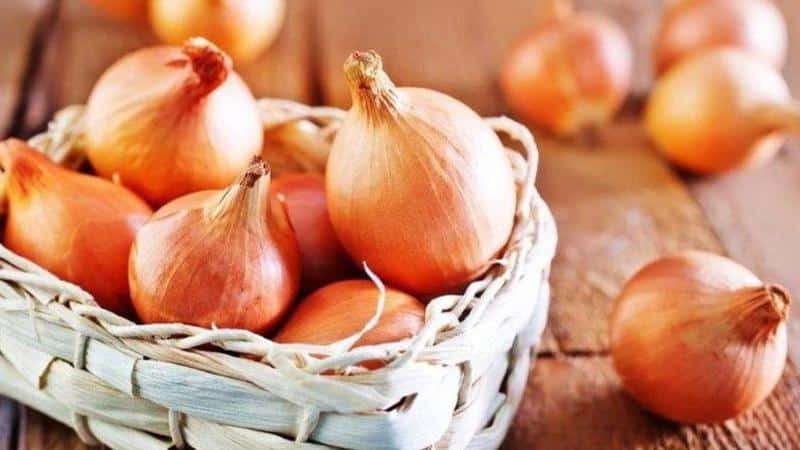
The husk, like the bulbs themselves, has many beneficial qualities. A fairly diverse and rich vitamin and mineral composition contributes to the health of the body and supports a number of functions.
Onion peels are of particular value for the treatment and prevention of diseases of the urinary and reproductive systems due to the presence of phytoncides in the composition. These substances provide a powerful antimicrobial effect, destroy infection, and prevent further growth and development of pathogenic microorganisms. In addition, phytoncides have a pronounced tonic effect and have a beneficial effect on the immune system.
Products made from onion peels stop the inflammatory process, which in turn serves as a good prevention of complications. It is also a powerful antioxidant - it neutralizes the effects of dangerous free radicals and prevents the degeneration of prostate cells.
An important element of onion peel is zinc. It takes part in the process of sperm formation, increases the number of sperm and increases sperm motility. The benefit of zinc for men lies in its ability to suppress the activity of 5-alpha reductase, an enzyme involved in steroidogenesis. It converts the male sex hormone testosterone into the potent androgen dihydrotestosterone, the presence of the latter in the body can provoke the proliferation of prostate tissue.
Internal use of a decoction, infusion or tincture of onion peels to some extent satisfies the body's needs for selenium. It is necessary to maintain normal functionality of the genital organs, and its deficiency can cause infertility.
Onion peels are an additional source of vitamin E, the main function of which is to ensure the normal functioning of the gonads.
The husk is used as an angioprotective agent in cases where prostatitis - a consequence of circulatory disorders in the pelvic area, congestion in the prostate gland. The product normalizes microcirculation processes, dilates blood vessels, regulates blood viscosity and fluidity, increases the strength and elasticity of vascular walls and capillaries, and activates metabolic processes in blood vessels.
Which bow is suitable
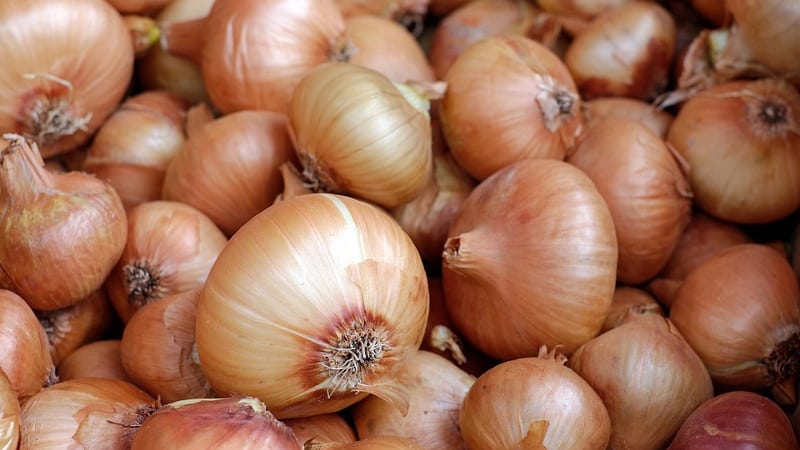
There are many types, varieties and varieties of onions, the peels of which, like the bulbs themselves, are used as medicinal raw materials. The most popular and available for purchase are white, yellow, red, sweet onions, as well as the type of onionshallot. However, the result of treatment largely depends not on the type of onion, but on its quality. Ideally, you need bulbs from your own harvest or grown in guaranteed safe conditions without the use of pesticides.
If you purchase onions in a store, market, or supermarket, it is important to correctly assess its quality. Pay attention to appearance, smell, color, storage features. A product of proper quality has a smooth, dry husk without signs of damage, spoilage by insects, without any foreign smell of mustiness or mold. It feels dense to the touch, without roots. Do not buy bulbs that are too large or small; the optimal size is 5-6 cm.
How to prepare medicine
There are several ways to prepare and use onion peels from prostatitis. The recipe is intended for both external use (oil and ointment) and for oral administration (decoction, tincture, infusion, extract).
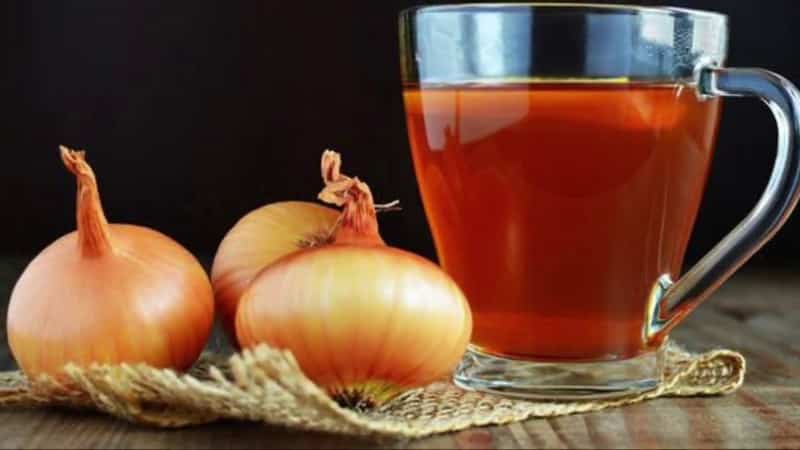
Infusion recipe:
- 2 tbsp. l. dry onion peels pour 400 ml of boiling water.
- Bring the mixture to a boil, cook in a water bath for 10-15 minutes.
- Cool covered, strain through several layers of gauze. Leave to infuse in a dark, cool place for 6-8 hours, or overnight.
For external use, prepare a more concentrated infusion of 100 g of onion peel and 300 ml of water.
Recipe for making tincture:
- Grind 100 g of onion peel, pour into a sealed glass container, add 500-600 ml of alcohol or vodka.
- Leave the mixture in a cool, dark place for a week. Then strain. Store in the refrigerator in an airtight container.
Used both externally to rub the anus and internally in small doses.
Extract recipe:
- Initially, you need to prepare an infusion of 2 tbsp. l. husks and 400 ml of boiling water.
- Then put the mixture on low heat and simmer until the infusion is reduced in volume by half.
- Strain and store in a glass container with a closed lid in the refrigerator.
Recipe for the decoction:
- Pour onion peels with cold water in proportions of 1:10 (per 100 g of peel 1 liter of water).
- Bring the mixture to a boil and simmer over low heat for 20 minutes. Cool and strain through several layers of gauze or a sieve.
Recipe for making ointment:
- Grind 200 g of clean and dry onion peels.
- Mix the husk with 300 g of petroleum jelly (can be replaced with baby cream, glycerin). Mix all ingredients well.
- Store in a dry, airtight container in a cool place.
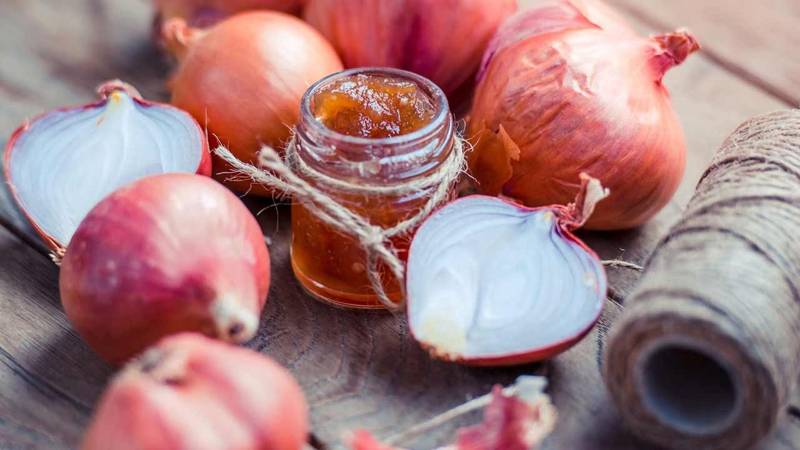
Oil recipe:
- Grind the onion husks, pour in olive oil or any other oil (pumpkin, flaxseed, castor oil) - three parts oil to one part peel. Mix.
- Infuse with the lid closed in a cool place for 2-3 weeks.
- Strain the oil and pour into a dark glass container. Keep refrigerated.
Folk recipes
Often, to prepare a medicine for prostatitis, onion peels are combined with other healthy products. This could be vodka, nuts, chicken eggs and honey. They not only enhance the effect of the husk, but also add new therapeutic effects.
Onion infusion with hazelnuts:
- 4 tbsp. l. Mix chopped onion peels with hazelnut shells (60 g). Mix.
- Dry ingredients pour 2 tbsp. water, bring to a boil and simmer over low heat for 50-60 minutes.Leave overnight at room temperature to infuse.
- The strained infusion should be taken orally, 100 ml in the morning on an empty stomach and in the evening for three weeks.
Infusion of onion peels with honey:
- Rinse one glass of husk and add 500 ml of water.
- Place on the fire, bring to a boil and cook for another 10 minutes. Leave covered for an hour to infuse.
- Add 3 tbsp to the strained infusion. l. natural honey, stir well. Take half a glass three times a day until complete recovery.
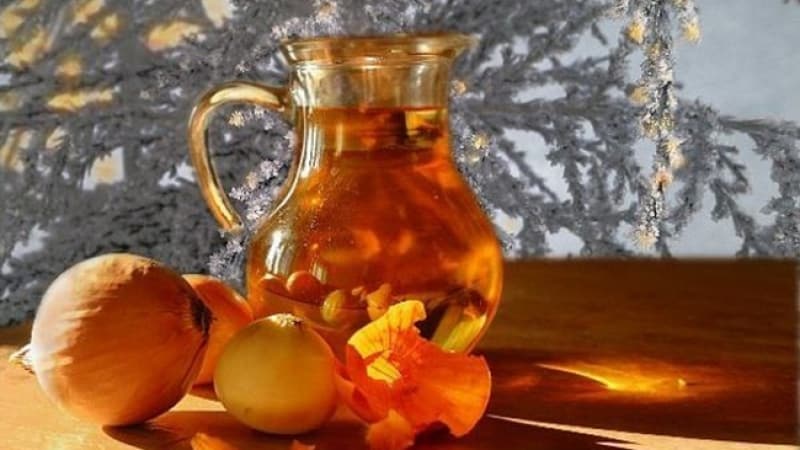
Onion peel candles:
- First you need to prepare a classic decoction by pouring 100 g of onion peel into 1 liter of water and simmering over low heat for 15-20 minutes.
- Mix the strained broth in equal proportions with gelatin and beeswax. Mix all ingredients well.
- Place the container in a water bath and cook until the mixture becomes homogeneous.
- Pour the mixture into a clean, dry container. When it hardens, cut it into oblong bars resembling the shape of candles.
- Use rectally at night for a month. Store candles in the refrigerator in an airtight container.
The use of onion peels for prostatitis
The dosage and course of treatment should be discussed with a urologist individually. The regimen of use depends on the causes of damage to the prostate gland, the characteristics of the course, the presence of concomitant diseases and contraindications, the age and lifestyle of the patient, the body’s reaction to the measures taken.
Internal
The average dosage of decoction, infusion, or extract for oral administration to an adult is 50-75 ml three times a day. You can take the medicine half an hour before or after meals with plenty of water.The course of treatment lasts on average 5-10 days, maximum two weeks, unless otherwise specified by the doctor. After a break, if necessary, the course can be repeated.
Tincture prepared with alcohol or vodka is taken in a smaller dosage - 10-20 drops at a time. The course of treatment is twice a day for 7-14 days or until the severity of symptoms is completely relieved.
External
To treat inflammation of the prostate gland, ointment, oil is used topically, or a compress is made from a decoction or infusion. Ointment, like oil, is applied to the anal mucosa or intact surface of the anus twice a day.
Onion peel for chronic prostatitis
Since chronic prostatitis is characterized by a recurrent course, bulb peel is an effective remedy for preventing exacerbations and possible complications. Also, for long-term inflammation, a decoction, infusion, tincture or extract is taken orally as an immunomodulatory agent. This strengthens the immune defense, increases resistance to infection, and provides vitamins, micro- and microelements necessary for the normal functioning of the body.
For reference. Onion peel for chronic prostatitis reduces the risk of complications such as cystitis, infertility, and pyelonephritis.
In acute form
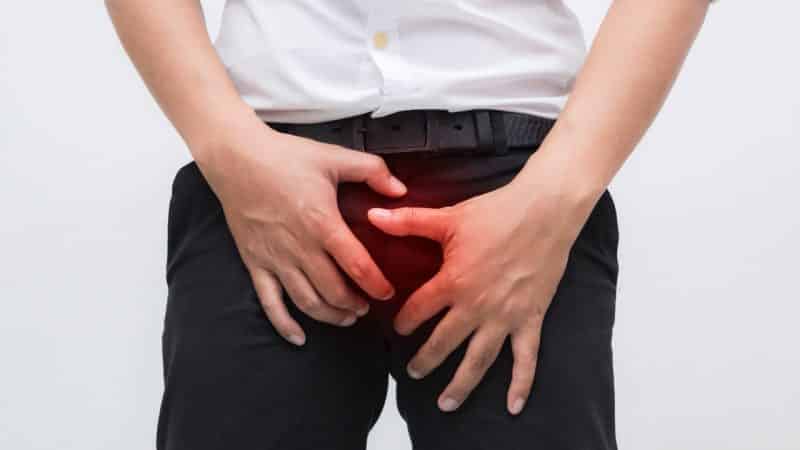
In acute prostatitis, onion peel reduces the severity of symptoms, eliminates inflammation, and restores the functions of the prostate gland. External and internal use of husk-based products solves several problems simultaneously:
- improves blood circulation in the prostate gland, which reduces the risk of congestion in the prostate and ensures better penetration of medications into the affected tissues of the organ;
- eliminates bladder spasms;
- has a diuretic effect, due to which it protects against swelling of prostate tissue;
- reduces the feeling of tension and pain in the perineum;
- improves the process of urine excretion - increases the strength and volume of urination;
- supports sexual function;
- produces a mild laxative effect, helps cope with existing constipation;
- normalizes metabolic processes in prostate tissues;
- potassium and magnesium in onion peels stimulate the nerve endings of the prostate gland and surrounding tissues.
There are no aggressive chemical components in the composition, so treatment should be long-term and regular.
Onion peels or medicine?
Patients with prostatitis need complex treatment, which includes antibiotic therapy, physiotherapy, and correction of the immune system. The patient is prescribed long courses of antibacterial drugs based on the sensitivity of the microflora.
Unfortunately, onion peels do not have sufficient antimicrobial activity to stop further growth and multiplication of the infection. This means that without synthetic drugs the disease will progress, pathogens from the inflamed focus will migrate throughout the body, affecting healthy organs and systems.
Is it possible to combine
If there are no contraindications in the patient’s history of prostatitis, then the shell of the bulbs is used in complex treatment, as an adjuvant or for the purpose of preventing prostate damage.It reduces symptoms, enhances the effect of medications, thereby reducing the need for medications, and ultimately speeds up recovery.
Advice. It is recommended to discuss the recipe and regimen for using products made from onion peels with your doctor. Depending on the characteristics of the course of prostatitis, treatment can be local, systemic (inside) or combined.
Advantages and disadvantages of treatment
| pros | Minuses |
| The main product is the shell of the bulbs, available for purchase all year round, and the bulbs themselves are inexpensive (about 35 rubles per kg) | Treatment of prostatitis with onions has contraindications and is not suitable for everyone |
| A simple way to prepare medicines | Therapeutic efficacy is not sufficiently pronounced to be used independently, without medications |
| Wide spectrum of action: anti-inflammatory, antimicrobial, analgesic, antispasmodic, antioxidant | In some cases, manifestations of an allergic reaction, weakness, nausea, dizziness, headache are possible. |
| In addition to its main effect, onions heal the body as a whole, improve the functioning of the heart, blood vessels, digestive organs, nervous and urinary systems | Requires long-term use due to the absence of synthetic compounds |
| Does not contain aggressive chemical components, rarely causes adverse reactions |
Contraindications
Treatment of prostatitis with onion peels at home is contraindicated for diseases and conditions such as:
- allergy to the product;
- diseases of the digestive system of an erosive and ulcerative nature;
- hyperviscosity syndrome;
- renal and liver failure;
- severe pathologies of the urinary system;
- bronchial asthma;
- increased stomach acidity.
Do not prescribe this folk remedy simultaneously with drugs from the group of non-steroidal anti-inflammatory drugs (NSAIDs), which inhibit liver function, or when drinking alcohol.
Side effects

Negative side effects when using husk-based products are rare. Such reactions are usually associated with uncontrolled oral use of excessive doses. In rare cases, patients complained of the development of allergic reactions in the form of peeling, redness, skin rashes, itching, and swelling.
Negative symptoms from the gastrointestinal tract (nausea, vomiting, stomach cramps), nervous system (headache, dizziness, drowsiness, fatigue, irritability) are possible.
In the worst case, the use of a folk remedy can provoke an exacerbation of existing chronic pathologies, which will complicate the treatment of prostatitis.
Reviews
According to urologists, in combination with medications, onion peels will not be superfluous in the treatment of prostatitis. This remedy has a healing effect on the male body: zinc and potassium stimulate the production of testosterone, improve nerve conduction, magnesium increases the time of sexual intercourse, phytoncides inhibit inflammation, relax smooth muscles, allicin normalizes circulatory processes, increases blood flow to the genitals.
Men who have used onion peel to treat prostatitis leave mostly positive reviews:
Oleg, 49 years old: «My gland was enlarged. The doctor prescribed the medicine “ProstOptima” and advised me to take a decoction of onion peels orally. I drank for 1.5 months.On examination, the prostate gland was normal.”
Sergey, 50 years old: “I advise from my experience - pay attention to such a folk remedy as onion peel for prostatitis. The cooking recipe is quite simple: add water to the peel, boil for 20 minutes, strain and take orally. Within a month of such treatment, pain in the sacrum and perineum went away, urination improved, and most importantly, sexual health was restored.”
Among the positive reviews you can find a negative assessment of the treatment with a folk remedy for prostate inflammation:
Alexander, 36 years old: “This decoction didn’t help me at all. I just lost time, and now I also have cystitis. Know that if you use it with medications, the drugs help, the decoction itself is useless.”
Conclusion
Onion peel is a simple, inexpensive and effective remedy in the fight against prostatitis and prostate adenoma. Due to its rich chemical composition, the product has a wide spectrum of action, which makes the treatment of urological diseases in men more effective and serves as a good prevention of other painful conditions.
The question of whether or not onion peels can be used to treat prostatitis at home should be asked to a urologist, and it is recommended to discuss the methods and regimen of use with him. Recipes made from onion peels have contraindications. Only with a careful and competent approach can a lasting therapeutic result be achieved without harm to health.